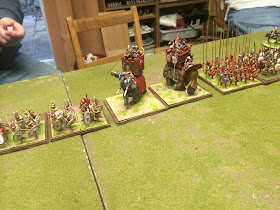This weekend saw the final battle in our Kings of War campaign over at Fishponds. The scenario for this 7th battle involved both sides trying to carry their magic artefacts to the portals so they could be empowered - the winner being the one to activate the most.
 |
The star gate portal
|
I entered battle at a disadvantage as I only controlled one of the three artefacts, having lost one in the last game, so a cunning plan would be needed. So I deployed my strongest units opposite the centre and right-hand portals (kings guard and elephant hordes), with archers between and Sergeants as fast-moving blockers in front. Against the left-hand portal I deployed chariots, my flying carpets and a further unit of kings guard with my artefact. Between sat my knights ready to support my artefact unit or try to flank the centre portal.
My plan was to attempt to use my flyers and sergeants to lock-down the enemy moves whilst placing two tough hordes on the portals, hoping to steal one artefact whilst being left unmolested with my own. Moving first would be a key advantage to get my blockers in place before the elves could move.
The elves plan seemed to similar but very focused on the centre and right-hand portals, with a flank attack against my right lead by several powerful combat units. This flank attack forced me to make a comprise and deploy by Djinn to oppose the fast-moving units there.
 |
| Elves troops focused on the centre / right portals |
 |
| Persians |
 |
| Fast-moving elves chaff |
 |
| Elephant and kings guard hordes ready to grab the portals |
Luckily the gods smiled on the Persians and I won the imitative, allowing me the first move. So I pushed forward with my blocking units, quickly overrunning the centre portal and contesting the right-hand one. The elves responded by pushing forward their heavy infantry in the centre and beginning the enveloping move on my right
 |
| Blocking units in place |
 |
| All very messy in the centre |
Seeing the threat to the centre the elves were forced to divert their cold-one knights towards the right-hand portal where my elephant horde lay in wait. Meanwhile on the left my chariots (2-man flying carpets) began chewing through the artillery deployed on a hill - these pesky sods had hurt my knights badly in the last game so I was keen to take them out before there was no repeat.
 |
| Cold-one riders move into position |
 |
| My carpets brave the flak |
An intense fight developed around the right-hand portal, as my elephant horde clashed with the cold-one riders. At 400 points its a mighty unit and duly crunched through the knights with support from my Djinn.
 |
| Crunch - only one winner here! |
In the centre though things looked shaky - my kings guard horde holding the centre portal attacked and badly damaged by a unit of elf spearmen. Only a very poor nerve role saved them from defeat.
Their blood-up, the elephants now crunched into an artefact carrying spear unit, once again supported by a flank charge from the Djinn. The elves were quickly dispatched leaving me in possession of a second artefact.
 |
| Persians holding on in the centre |
 |
| Nellie eyes up another victim |
Back in the centre the final action saw the knights charge into the flank of the final artefact carrying unit, beating them back and capturing the final artefact.
 |
| End-game |
So after 5 turns the elves were routed, leaving the Persians holding all three artefacts and able to claim a hard-fought victory. The game was very close until the 4th turn when a sudden collapse in the elfish formation left them vulnerable to devastating flank attacks. Moving first has been a major advantage as it enabled me to limit the elves ability to manoeuvre and force them to respond to my plan.
The elephant horde has impressive stats, but at 400 points its a major gamble to take it. In this scenario the Djinn (greater air elemental) proved the star unit as it launched a series devastating flank attacks and routed 3 units as well as holding off a powerful hero who could have flanked my elephant horde .

 |
| Nlow the man down |
























































